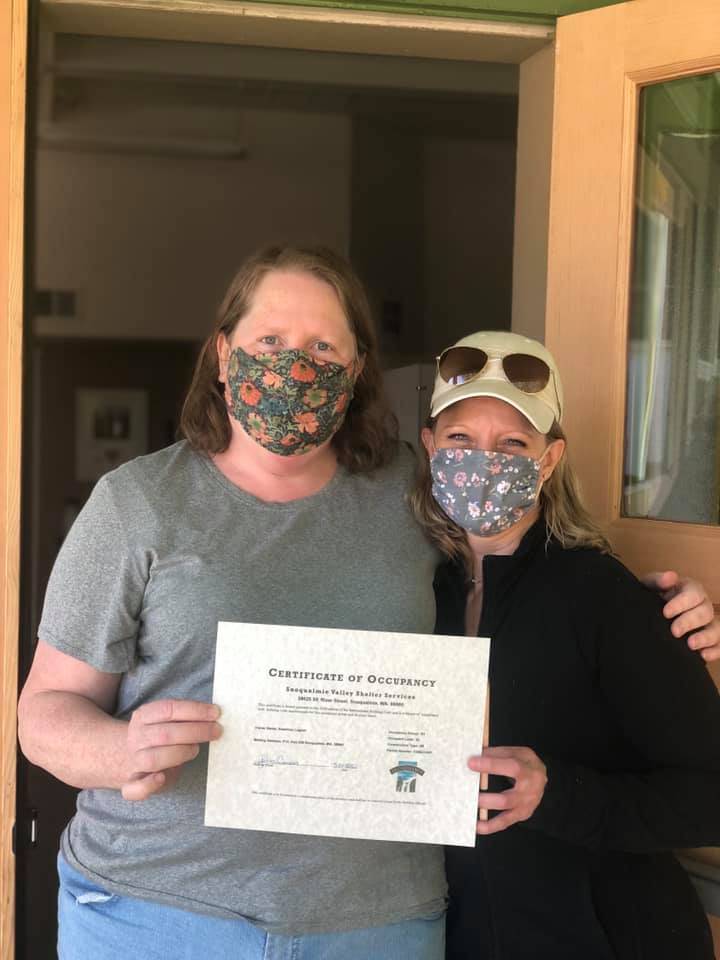When the pandemic struck, the Snoqualmie Valley Shelter Services had to suspend its meal program due to concerns of spreading COVID-19. The program allowed volunteers to donate meals to those experiencing homelessness.
The shelter, which had previously been reliant on meal donations from volunteers to feed its residents, now had to use its own funds to purchase meals, or find ways to produce meals through the Preston Food Bank.
“In the past we had 400-plus people providing meals and we dropped down to none,” said Janice Formisano, meal coordinator and board secretary for the shelter. “It was having a huge impact.”
Now, the shelter is once again building up its base of volunteers, asking residents for help in providing meals, or donations, for those experiencing homelessness.
Throughout the pandemic, the Snoqualmie Valley shelter has been operating at limited capacity in order to comply with COVID-19 precautions. The Valley Record previously reported that the number of those facing homelessness in the valley increased last year, prior to the pandemic, from 99 unsheltered people in 2019 to 167 in 2020. An additional 61 people in northeast King County were homeless and living in shelters.
In May, Formisano said she announced that the shelter had reintroduced its meals program. By June, she said they had 18 meal providers, with about 38% of meal slots filled.
“In July, I put a mass appeal out to 400-plus people to put my plea out there that we were really desperate,” Formisano said. “If I can get 90 people, that would fill all the slots. I would just be in heaven.”
Currently about half of the shelter’s meal schedule is full. If there is a meal vacancy that cannot be filled using volunteers, or the food bank, then the shelter must produce the meal using its own budget.
“Our staff ends up making the meals, and they have been wonderful about it, but it’s a lot for them on top of running the shelter and taking care of the needs of people,” said Jennifer Kirk, executive director of the shelter.
Producing the meals also makes it difficult for the shelter financially. During the pandemic, the shelter moved to and remodeled the American Legion Post Building building in Snoqualmie. The shelter made the move to change from a winter-only overnight shelter, with daytime services, to a 24/7 year-round overnight shelter, in order to meet increasing need.
“In shifting to a 24/7 model, our budget is higher, so we would love to see more money from donors,” Kirk said. “Even though we receive funding, it doesn’t cover everything we do.”
Alongside the move, the shelter has begun handing out motel vouchers to residents experiencing homelessness, providing them a place to stay that is near resources such as work, child care and a support system. The vouchers allow the shelter to place residents in any motel throughout the county, besides Seattle, as they work with a case manager to recover from homelessness.
The shelter is also working alongside the Health Through Housing initiative and discussing possibly purchasing a five- to six-bedroom house in the valley.
With the move, the shelter has added an expanded kitchen, a second bathroom and a shower for residents. Residents from the shelter went from sleeping on mats on the ground to sleeping in beds with separating walls. The space also has five mats for overflow and now provides residents with headphones and laptops.
“It creates independence for people. They are less frustrated, and it really helps our folks with mental health challenges, that they have their own space,” Kirk said.
In the new building, there is no time limit for how long residents can stay, and they do not have to worry about their spot being taken. Before, residents had to pack up all their belongings each day and return to the shelter at 8:30 each night.
“It’s been a massive shift,” Kirk said. “People are more rested and feel supported.”
Kirk said one of the biggest changes at the shelter since the pandemic is its ability to provide a community meal. Prior to the pandemic, the shelter had a community dinner each night that provided an opportunity for connection between staff and residents. However, the CDC has yet to lift COVID-19 requirements for shelters, meaning everyone is masked and sitting six feet apart.
“Historically, we all sat around and ate as a family unit,” she said. “All of that went away with COVID.”
Because of this change, Formisano said one way to make residents of the shelter feel appreciated is consistently bringing a meal each week.
“When we have a consistent day each week where they know a meal is coming, it brings a lot of joy to our residents,” she said. “I’ve committed to every Wednesday’s dinner. They know I’m coming and occasionally they can ask for something and it makes them feel loved and cared for. Everyone comes on Wednesdays.”
Formisano and Kirk said the shelter has received great support from the city and police department, particularly praising the work done by Snoqualmie Mayor Matt Larson. The city provided the shelter with $56,000 to help with the remodeling of the its new building.
However, the shelter still faces some uncertainty. A big chunk of the shelter’s funding ends in June 2023, a few months after its lease at the Post building is set to expire.
“It’s been difficult. We’ve never had funds to purchase our own building, so we’ve always been reliant on gracious donors to provide space for us,” Kirk said.
Both Kirk and Formisano said the goal is to retain enough support and funding to keep the shelter functioning as a year-round overnight shelter. Formisano said the board is working toward having a fundraiser to support the shelter’s growth.
“We want to continue the 24/7 shelter,” Kirk said. “We don’t want to go backward.”
To donate to the shelter visit: bit.ly/3icxXwA


